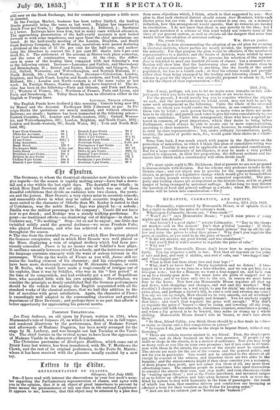For the present, I would merely beg you to consider
whether the objects we seek, and the inconveniences we would avoid, may not both be met by some such arrangement as the following. Unite the whole of the educated classes, on whom you would confer the franchise, in one constituency. Lei them vote by letter ; each person having as many votes as there are mein-. hers to be elected; and permit each voter to give his votes cumulatively to one or more candidates. Under this arrangement, those who have a special in- terest in common, of great importance, which they desire to bring before Parliament, would always be able to secure one or more representatives, according to their numbers. They would not, however, be compelled always to send up class representatives ; but, under ordinary circumstances, party, locality, the merits of public men, &c., would guide their choice in a whole- some way. Some time back, I was much struck with papers in the Spectator on the protection of minorities, in which I think this plan of cumulative voting was proposed. Possibly it may not be applicable to an uneducated constituency. But for a large constituency of intelligence, it may be made a very perfect method to represent, in their fair proportions, the different sections and in- terests into which such a constituency will often divide itself. F. H. DICKINSON.
[We must again reply to Mr. Dickinson, that at present we are not prepared to discuss details with decision. But his scheme only professes to refer to the literate class ; and our object was to provide for the representation of all classes, in prospect of a legislative change which would give to householders under twenty pounds everywhere a vast numerical superiority. The pro- perty and trading classes are as important as the literate class, and in as great danger of being swamped by universal suffrage. Before long we may discuss the question of local and general suffrage as &whole ; when Mr. Dickinson's scheme will be taken into consideration.—En.]


























 Previous page
Previous page